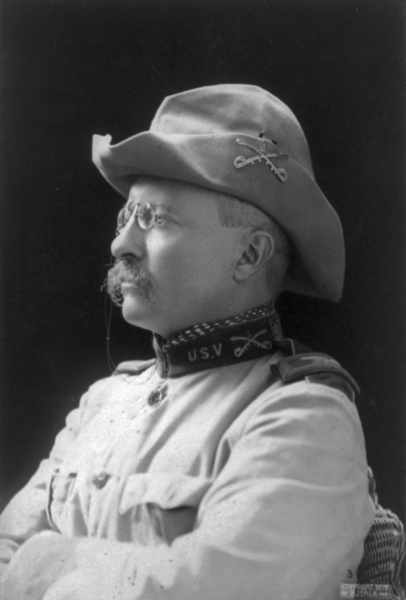During his political career, Theodore Roosevelt and imperialism were closely linked. With imperialism as a rather new concept in the U.S., and the need to establish the country as a world power, it’s no surprise that Teddy – renowned for being unabashedly progressive in both political and social arenas – led the charge.
Imperialism was argued by Captain Alfred T. Mahan in his 1890 book, The Influence of Sea Power Upon History. Mahan argued that having a strong navy required that a nation have numerous ports (all over the world) in which to safely anchor their ships. He also argued that having these ports would lead to an increase in global trade for the country who possessed them. With the U.S. already having expanded to Alaska and Hawaii (continentally separated from the rest of the country), as well as the belief that it was the God-given responsibility of the ‘white man’ to protect and lead the world, the atmosphere was ripe for harvest. For Theodore Roosevelt imperialist notions meant securing as many ports and colonies as possible, to cement America as a global power in both military and trade capacities.
At the end of the Spanish-American War, the U.S. was torn regarding disagreement over how to handle the colonies they had rescued from Spain. Many imperialists said the Philippines would be an ideal port and military base, while anti-imperialists’ position was to let the citizenry become independent and any failure to do so was anathema. The U.S. eventually annexed the Philippines, leading to a decades-long battle lasting until 1946, which caused the deaths of more Americans than the entire Spanish-American War.
In Puerto Rico, the same decision for annexation met with less resistance, and it was made a U.S. territory. Cuba was granted independence, but hindered by the Platt Amendment in their constitution, giving the U.S. power to intervene in Cuban affairs and final approval on any treaties. Theodore’s actions in these decisions had a lasting impact on America, leading to the expansion of its global dominance and military powers abroad. Teddy’s staunch advocacy for feeding his country’s insatiable need for expansion led to consistent involvement in foreign affairs, extensive involvement in creating favorable trade regulations, and a legacy of progress. Whether these results were negative or positive remains to be seen, and is, arguably, very subjective.
Two famous Theodore Roosevelt imperialism quotes are:
“We do not admire the man of timid peace. We admire the man who embodies victorious effort.” 1899, from his book, The Strenuous Life.
“We cannot sit huddled within our own borders and avow ourselves merely an assemblage of well-to-do hucksters who care nothing for what happens beyond. Such a policy would defeat even its own end; for as the nations grow to have ever wider and wider interests, and are brought into closer and closer contact, if we are to hold our own in the struggle for naval and commercial supremacy, we must build up our Dower without our own borders.” 1899, from his book, The Strenuous Life.

